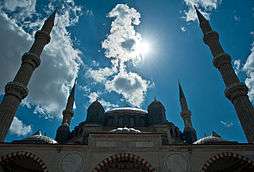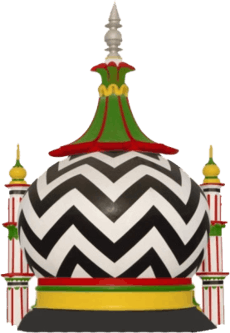Majlis-e-Tahaffuz-e-Khatme Nabuwwat
Majlis-e-Tahaffuz-e-Khatme Nabuwwat | |
|---|---|
| Secretary-General | Hafiz Shuaib ur Rahman |
| Leader | Saeed ur Rahman Ahmad |
| Founder | Mohammad Abdul Ghafoor Hazarvi |
| Founded | 1950 |
| Ideology | Khatam an-Nabiyyin |
| Colors | Green |
| Website | |
| http://www.khatm-e-nubuwwat.org | |
| Part of a series on |
| Islam |
|---|
 |
|
Related topics |
|
| |
|---|
 |
|
Lists |
|
|
Majlis-e-Tahaffuz-e-Khatme Nabuwwat ("The Assembly to Protect the End of Prophethood") is the programmatic name of a Pakistani Barelvi organization and Islamic religious movement in Pakistan aiming to protect the belief in the finality of prophethood of Muhammad based on their concept of Khatam an-Nabiyyin.[1] It was founded by Mohammad Abdul Ghafoor Hazarvi in 1950 with Zafar Ali Khan, Abdul Hamid Qadri Badayuni, Khwaja Qamar ul Din Sialvi, Syed Faiz-ul Hassan Shah, Ahmad Saeed Kazmi, Abdul Sattar Khan Niazi, Pir of Manki Sharif Amin ul-Hasanat, Muhammad Karam Shah al-Azhari, Sardar Ahmad Qadri and Muhammad Hussain Naeemi. Later on the prominent Barelvi leaders Shah Ahmad Noorani, Muhammad Shafee Okarvi, Syed Shujaat Ali Qadri, Iftikharul Hasan Shah and Khalid Hasan Shah also joined them oppose the Ahmadiyya Movement.[2]
After Independence of Pakistan
The roots of Majlis-e-Tahaffuz-e-Khatme Nabuwwat can be traced back to the 1880s when Mirza Ghulam Ahmad of Qadian proclaimed himself to be a prophet in Islam. The organization gained momentum during the 1953 riots against Ahmadi Muslims. The Court of enquiry report on the disturbances explains the real reasons for this violent uprising against Ahmadiyya. Main reasons being criticism of Ahmadi was due to the theological differences and using the Ahmadiyya issues by Muslim conservatives to gain political mileage. The rioters had three major demands:
- Removal of Sir Muhammad Zafarullah Khan from the foreign ministry
- Removal of Ahmadi Muslims from top government offices;
- Declaration of Ahmadis as non-Muslims.
The movement launched countrywide campaigns and protests to persecute Ahmadis across the nation. Majlis spearheaded movement to declare Ahmadis as non-Muslims.[3]
Ahmadis declared Non-Muslims in 1974
Many Islamist theologians Pakistan particularly Ulama-I-Ahle-Sunnat under the leadership of Shah Ahmad Noorani Siddiqui started a successful campaign against the Ahmadi Muslims and compelled the members of the National Assembly to declare Ahmadis as non-Muslims. And such a clause was inserted in the 1973 Constitution of Pakistan declaring that followers of Mirza Ghulam Ahmed are non-Muslims by Second Amendment to the Constitution of Pakistan.[4] After meeting the first agenda, Khatme-Nabuwat started the next phase of their campaign – to force Ahmadis to comply with the new law. They started demanding legal sanctions on Ahmadis barring them from using the title of Muslim. This campaign was at its peak when Shah Ahmad Noorani and Punjab-based Khalid Hasan Shah were leading the Kul Jamaati Majlis-e-Amal Tahafuz-e-Khatam-e-Nabuwat in 1984 and 1985.[5] The then president General Muhammad Zia-ul-Haq passed an ordinance in 1984 amending the Pakistan Penal Code (PPC) that called for punitive sanctions on Ahmadis in 1984, commonly known as Ordinance XX.[6]
Banned Khatme Nabuwwat leaders
In November 2012, the Government of Pakistan banned Abdul Latif Khalid Cheema, leader of Tehreek-e-Khatme Nabuwwat and Secretary General of Majlis-e-Ahrar-e-Islam,[7] from delivering a speech in the Chichawatni and Sahiwal District area due to the security situation in Muharram. The President of Majlis-e-Ahrar Syed Ata-ul-Muhaimin Bukhari was also banned from delivering speech for three months in Multan.
Khatm-e-Nubuwwat Conference
Annual Khatm-e-Nubuwwat Conference is held every year at Jamia Masjid Ahrar Rabwah under the aegis of Majlis-e-Tahaffuz-e-Khatme Nabuwwat and Majlis-e-Ahrar-e-Islam.[8]
See also
- Ahmadiyya
- Prophethood in Ahmadiyyah
- Mirza Ghulam Ahmad
- Meher Ali Shah
- Mohammad Abdul Ghafoor Hazarvi
- Majlis-e-Ahrar-e-Islam
- Syed Ata Ullah Shah Bukhari
- Tehreek-e-Khatme Nabuwwat
- 1953 Lahore riots
- 1974 Anti-Ahmadiyya riots
- Shah Ahmad Noorani Siddiqi
- Khatme Nubuwwat Academy
- Ordinance XX
References
- ↑ "Naqeeb". Naqeeb-e-Khatme Nabuwwat, Qasim Cheema. September 2012.
- ↑ "Monthly Naqeeb-e-Khatm-e-Nubuwwat". Naqeeb-e-Khatme Nabuwwat. November 2012.
- ↑ "Akhbar-ul-Ahrar". Naqeeb-e-Khatme Nabuwwat, Qasim Cheema. November 2012.
- ↑ "Balochistan issue and the responsibilities of Govt.". Naqeeb-e-Khatme Nabuwwat, Qasim Cheema. October 2012.
- ↑ "shehr-e-ashoob by Professor Khalid Shabbir Ahmad". Naqeeb-e-Khatme Nabuwwat, Qasim Cheema. November 2012.
- ↑ "Tahafuz-e-Khatm-e-Nubuwwat and media war". Naqeeb-e-Khatme Nabuwwat. November 2012.
- ↑ "عبداللطیف خالد چیمہ کی دو ماہ کے لئے ضلع ساہیوال میں زبان بندی کا حکم جاری". Daily Jang. 12 November 2012.
- ↑ "Qadianiat". Naqeeb-e-Khatme Nabuwwat, Qasim Cheema. September 2012.
